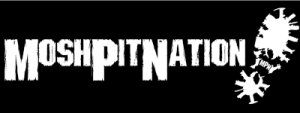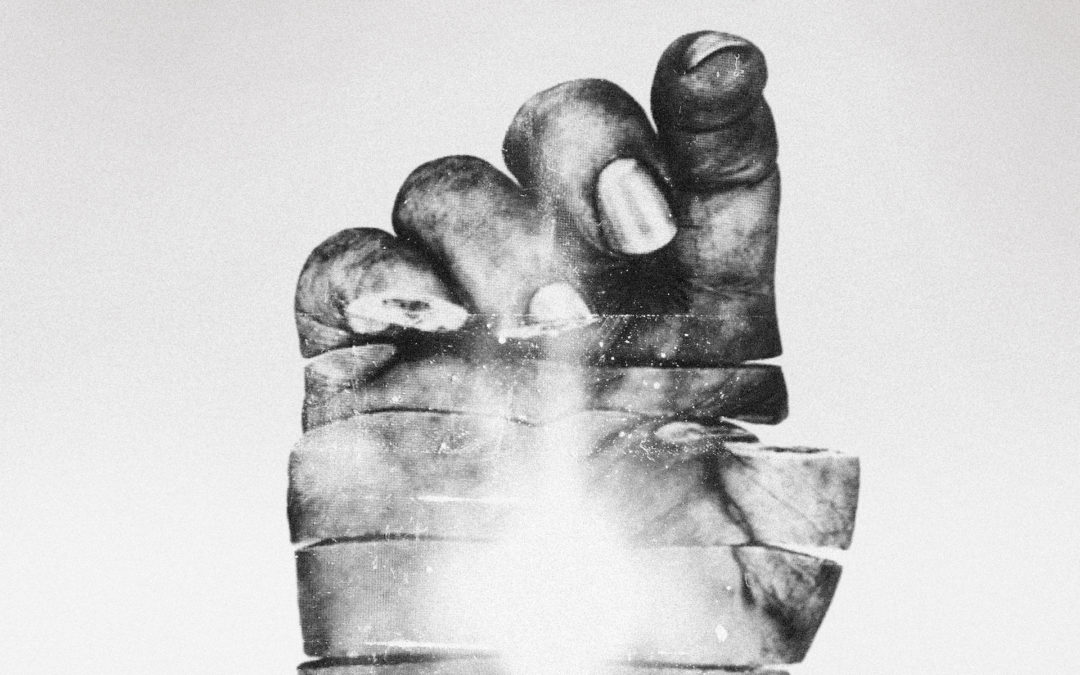Band – Feed Them Death
Album – Negative
Country of Origin – UK
Genre – Avantgrind
Release Date – May 7, 2021
Label – Brucia Records
Author – Hayduke X
It is our pleasure today to premiere Minima Moralia for you from the upcoming album Negative by the ever creative and abrasive Feed Them Death. The track starts out with belligerence, as Void’s bellows hit the listener square in the chest, and then devolves and evolves into a racing, grinding, destructive cacophony of purpose. Hit play to hear for yourself, then jump below the player for my full album review and an extensive interview with the creator. Don’t forget to pre-save the single for your playlists, which can be done here.
I first became aware of Feed Them Death through the Exalted Woe Records full length version of No Solution / Dissolution. I remember enjoying the digital promo I received, but ended up passing on a review (though I don’t remember my specific reasoning). Then I received Panopticism: Belong / Be Lost through I, Voidhanger, and it quickly became clear that I couldn’t move past this project without spending some words. A review and interview followed, which can be read here. The EP For Our Culpable Dead continued the rise of this mind-bending project. Another feature, including review, was published, which can be read here. All of that brings us to today, the day in which I sit trying to determine how to write about Negative, the third full length by Void, the sole creator of Feed Them Death, under this moniker.
Truth be told, as the avantgrind of Feed Them Death becomes tighter and more focused, yet ever more experimental, it becomes more difficult to write about. As with all of these releases, the album is a difficult listen. One has to devote time, focus, energy, and thought to what one is hearing. Don’t press play on this album expecting an easy groove, a fist pumping rhythm, and a sing-along chorus. Void is intent on pushing boundaries in a way that sparks concerted effort, but in a way that leads to great payoff to those willing to take the journey.
From a basis of dissonant grind, elements of noise, some harsh, some ambient, some in-between, are added. Drumming is staccato and stutter-stop/abrupt start in nature. The bass is an ever-present ominous attack on the senses. Void vocal attack comes in two parts that alternate in unrecognizable patterns, sometimes falling nearly on top of each other. One is a deep bellow, while the other is a harsh cry. The only constant about the time signature is that it will change at some unexpected time. I’ll let you read Void’s own words in the interview in regards to production. Suffice it to say that this album is as destructive as it is thought provoking.
Feed Them Death continues to show my belief in the exceptional nature to be true. Panopticism is where the project really took off for me, but the climb has continued to be steady since that initial high point. For seekers of knowledge, for thinkers, for those who prefer the difficult side of music, I can’t recommend Negative highly enough. Jump below for an extensive interview with Void.
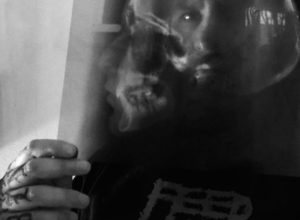
Hayduke X: Thanks for taking some time to speak to me again. We covered a lot of the background of the project when you answered questions for Belong/Be Lost, so I’ll focus on Negative here (and maybe a bit of For Our Culpable Dead). Congratulations on another mind bending release. How tied together is it with your previous releases?
Void: Thank you for having me again. It’s always a pleasure chatting with you. And sure, it’s fine to focus more on Negative, also because it provides quite a chunky amount of references to go back to and eventually shed some more light on the past releases as well. So guess I answered already in a way: the new album is most definitely in close relationship with the previous releases, both musically and thematically. Musically, Negative is particularly close to the latest EP “For Our Culpable Dead” as the eleven songs had originally been composed and intended as one whole longer album. Travel restrictions made it hard to split the recording sessions, therefore I did end up recording all the songs in one go. The decision of releasing three songs as an EP before dropping Negative was due to both my attempt of securing FTD a longer shelf life in between albums, keeping blood flowing through the veins of the project, and also due to my release schedule with Brucia Records. Moreover, with Panopticism only a couple of months old at the time of completing the new album, I didn’t want to suffocate the chances of Panopticism being heard by chucking out something new immediately.
Musically, Negative is a further progression into the realm of non-conformity for me: it’s the apex of my personal research of de-construction and re-amalgamation of my music into something hopefully unique, and yet the album grew over time somewhere inside of me, and somehow it embodies all the different phases of the project within itself: the straightforwardness of the beginning and the experimentalism of the the last two releases.
Thematically, Negative completes something that could be called “the Frankfurt school trilogy”: after No Solution / Dissolution borrowing from Marcuse, and Panopticism based on two books by Foucault, this new album is inspired by the writings of Adorno, and especially those relating to the commoditization of art within the cogwheels of consumerism.
HX: Wow. Lots to dig into there, but I’ll start at the end here. I’m not particularly familiar with Adorno. Can you give me the Cliff Notes?
Void: As you may have gathered already, I struggle with conciseness, which is the ultimate paradox since I predominantly play grindcore, but will try to be exhaustive whilst providing a brief summary.
Adorno was an author and philosopher associated with the Frankfurt school of critical theory. He was also a composer, and I actually used parts of his music (and excerpts of an interview) in Panopticism in a drone track called Prescience, with the aim of providing a foreknowledge of the themes that I had already in mind for the following album. He is somewhat famous for harshly criticising jazz and modern music as an embodiment of the so called commodity culture, treating it as the byproduct of the proliferation (and acceptance) of values inherent to the mass production of consumption goods, but in artistic terms. Much of his writing could be described as anti-positivist. The album title Negative derives from one of his books called Negative Dialektik, in which he opposed the positivist idea of a dominating thought projecting the real images of a fragmented truth against a drape of negation in order to seek some positive reinforcement: he advocated instead a negative negation, so to speak, or the legitimacy of seeking something negative through negation as opposed to a positive synthesis.
He also wrote a book called Minima Moralia, which is quite aptly the title of the song that we are premiering today: it’s a play on words on Magna Moralia, which was a work on ethics attributed to Aristotle. The idea behind the book (and the lyrics here) is that living a good life is not possible anymore because the fabric of our society is damaged and humanity is inhuman.
HX: Am I understanding correctly then that it’s Adorno’s claim (and yours as well) that acknowledgement of this key idea (a good life not being possible) is necessary and beneficial for us to recognize? Are those who have a positivist view not only wrong, but harmful to themselves and/or others?
Void: I think it’s crucial to recognise that the social fabric of our society is ruined, and a good life intended as an ethical life for everyone where all parts of our society are safe and able to prosper is not only impossible to imagine, but potentially a dangerous idea to cling on to. In first instance, it creates a false and distorted trajectory of growth for us all, allowing us to look at evolution as a continuous line where we were oh so wrong before, but hey happiness will prevail in the end. Whereas the traces of our evolution as a specie have clearly marked the steps of our demise in our own ecosystem. Second, it creates a distorted sense of individual responsibility towards the fate of this planet – a sort of compartmentalisation of all those instances in life that instead should make us act as a whole rather than individuals: how can we honestly be happy when there’s poverty, slavery, animal cruelty, starvation and wars around us? How can we think that we are doing something when nothing really changes? We are force-fed the chimera of progress on one hand, and fall for instant gratification and a weird sense of self importance on the other: we think that our voice can be heard, and make a change, and indeed it can, but perhaps we should liberate ourselves from the assumption that as a collective we are acting for a greater good. There’s no social perspective in positivism: I feel it’s only a way for us to trick ourselves into thinking that we know what we do, that we do our parts and the responsibility of failure is not on us, when in fact it is on everyone.
HX: Is there another path forward?
Void: Would be contradictory of me saying so now, huh? ahaha
Well, paraphrasing Foucault when he was asked whether there was a solution to the problem of corruption in the administrative spheres of power (intended as people have ideals only until they fight in opposition to something, but become part of the problem the moment they rise to power) he then said “My solution? There’s no solution” which kind of inspired the title of my first album with FTD “No Solution / Dissolution”.
Maybe seeing no solution is the way forward and out of the illusion of self importance and an alarm bell for us all to act upon collectively.
HX: There’s certainly a lot to think about there, and much of it I tend to agree with. I tend to be a natural optimist, so I think I always hope for some kind of answer. I fully agree that, as things are in the world right now, there is no path forward. Incremental change won’t solve anything. I think a lot about acting collectively, as you mentioned at the end of your last response, and wonder if there is a way forward through some radical change in that direction. I would add, for my own part, that we need to think far beyond only humanity in that though. Sorry to rant in what’s supposed to be an interview. Lol
Void: Absolutely agree, and that’s not a rant at all. In traditional interviews there always seem to be a predetermined shift of spotlight from one to the other and back – I think it’s nicer to imagine us having a chat in a bar. Moreover, I totally agree with you, but also think that being anti-positivist doesn’t mean not having hope, or being a nihilist. We most definitely need to find a way out of this, collectively as you said, and way beyond humanity, but it can’t come from the usual things we do. Even if we set ourselves to do more of something, improving for the better. I’m vegan, but in no way think that is enough, or that if everyone was vegan we’d get rid of animal cruelty. Animal cruelty is embedded in us because we have a propensity for being cruel to what we consider being weak, and showing weakness and submission for whoever we consider being stronger. We live in the society we have shaped: acknowledging this collectively could be a new beginning.
HX: Yeah, I’m fully with you there. My biggest fear, I think, is that we collectively won’t be able to act fast enough. Or even that the majority of humanity won’t realize the serious issues fast enough. I don’t know how much you follow US news, but the storm that hit Texas, and the responses to that, show how far we have to go to even understand these issues as a global collective.
Void: Sadly, even in the event that an epiphany of sort was on the horizon, we couldn’t really call it global unless all the cancerous cells of our collective body were expelled in full, once and for all.
Disparity has the tendency to spread rapidly amongst humans, and whilst we debate as to whether River Greed is worse than River Ignorance, we let our inclination to being superficial dump tons of our own shit into the ocean of our collective future.
It looks like this planet is kicking us all out, expediting the grand expulsion plan, but we really need to become aware of the fact that we played a massive role in that, exhausting all our future resources in about the space of one or two generations. I mentioned veganism, but that’s only a parable to tell some of the absurdities of the world we live in. We destroy land to feed animals, so that they could be fed to dispossessed humans, and with all costs being externalised for us all to pay the difference between a 2 usd burger deal and its real cost to the planet. The same thing we do with everything: we learned how to externalise the costs of our actions so that others will pay for it one day.
For this reason, I say that I think we have run out of time: but perhaps there is still a dignified way to leave. Perhaps one hot meal for someone without anything, or a shelter for the homeless, or a day without mental health issues being stigmatised and us all assaulted by impossible models of apparent and superficial happiness, and the list goes on and on. It would at least restore the dignity of living for however long we have left here.
HX: I hear that. I think even that would be something. You said way above that the EP For Our Culpable Dead was originally meant to be part of Negative. How did you choose which songs to use for the EP?
Void: The first song on the EP, “A Subjective Tragedy” was intended as the odd one out from the bunch, because it was the only song thematically different from the rest of the album, being inspired by the myth of Faust, as written by Pessoa. For the other two songs I had to ask my label partner to be a negotiator and mediate between the producer and the musician in me: we picked the other two, because they were the longest, and we wanted to give people more minutes: incidentally they were also thematically very close to home for me in that precise period of my life, as I was coming to terms with the responsibility of our folks in making us inherit a world (both internally and externally) where joy was inherently unattainable.
“For Our Culpable Dead” and “The Unattainable Joy” have both been remastered and will feature as bonus tracks for the vinyl edition of Negative.
HX: Given how well the two releases fit together, as well as the connections with the other releases, do you have a recommended method of listening? Would it be just by chronological release?
Void: Good question. I’ve never thought of that. I just realised that when I discover a new band I usually like to work my way backward, seeing if I can dig out embryos of the things I liked about the latest release from back when they were just tentative ideas perhaps. Kind of observing the evolution of their sound, but I’m hindsight. Tend to do the same with books actually, usually reading the last two / three pages before starting the book, because I like to forget what I read and find a sense of familiarity when I get there again.
So yea, I would start from Negative and work my way back.
HX: Interesting! And obviously, Negative is best listened to on vinyl. What makes this the release to start into vinyl?
Void: It might not sound very romantic, but the fact that I co-own the label was a deciding factor for us to do vinyls this time. Don’t get me wrong. I always wanted to do vinyls both as a musician and as label owner, but the cost is very high. It took us a while to get to the point of breaking even, and still, everything we do is essentially not for profit and just straight out of love for the music and the people we work with. We have wanted to start putting out a 12” for a long time, but we sensibly decided to start with FTD, because it’s a project that we know well and had some data to back up the financial decision, so used it as a crash test dummy. All going well, it will be the first of many more we will do with Brucia.
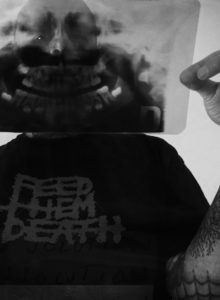
HX: That makes some sense. Hopefully the vinyl side will take off for you, but if not, I don’t think the artist will be complaining to the label… Musically, Negative is your most ambitious in terms of avant garde elements, yet remains remarkably cohesive. What are some of the ways you’ve pushed your songwriting here that you haven’t on prior releases, especially ways that the listener might not initially catch?
Void: I primarily think that Negative (and in part For Our Culpable Dead) was the first release for me where I had an almost exact vision of where I wanted it to go.
That doesn’t mean that there was no room for spontaneity, but I felt that the general direction of my musical journey was finally at a point where I could re-visit and dignify the more aggressive and straightforward things I did on the first album, and amalgamate them with the most experimental things of the following releases.
For the first time, I also worked on songwriting not only focusing on individual songs, but wrote most songs with a general idea of where I wanted them to be placed in the album, so I spent some serious time to consider the overall album dynamics in order to be in control of the flow.
Every element in the mix is considered carefully and used to increase the dramatic undertone of the album: that is not something new for me as I have done the same in the past, but this time I pushed more on mixing hi-fi with lo-fi, and worked to incorporate the noisy bits more as a part of the structure of a song, rather than as a disturbing element adding weird frequencies on top of fast riffs.
For Our Culpable Dead and now Negative were/will be released on your own label Brucia Records, as has already been noted. Will that be the plan going forward?
Void: Yea, I think that we found a synergy there and have really no reason to go back and involve other labels. I am eternally grateful that I had the chance to work with I, Voidhanger in the past and I’m still in excellent relationships with them. I think that Brucia is shaping up nicely and I’m extremely proud of our roster: as a musician I’m excited to have my releases next to bands like LaColpa, Derhead, 0-Nun, The Sun and the Mirror and so many more that we will be announcing moving forward.
I like to be involved in all the aspects of putting out a record, and it’s extremely rewarding doing it with my releases too, both because it helps to establish us further as a label, but also because I trust that everything we do is done with all our heart and passion.
What we are trying to create is more a network of talents who are able to support each other, rather than a traditional label, and feel that FTD has something to bring to the table as well as a lot to receive back from the amazing bands and individuals we partner with.
HX: Brucia is fairly new. Why did you two decide to start it? How did that all come about?
Void: Giorgio started it off on his own a couple of years back, but predominantly as an outlet he could use to self-release some of his own projects.
He gradually started to collaborate with a few bands and other labels which were intrigued by the layouts he was producing, and so the first incarnation of Brucia got around to do a few nice co-productions.
We started talking early last year about the option of growing the label, and so we decided to join forces. I think he was doing a great job by himself before, but of course now we are more efficient. Since we started collaborating, we managed to sign a few very good bands, did about ten releases as of today, and the rest of the year looks pretty busy as well.
We both have day jobs and Brucia is something that we do out of passion and not for a return of sort – it’s hard work, but rewarding and it’s important for us to have fun doing it, so we try to stay true to our values: treat bands the way we like to be treated as musicians; release and produce only music we genuinely like; create visions rather than products, and try to build a quality roster with equal opportunities for smaller promising acts and more affirmed bands alike.
HX: Any big surprises coming from the label that you’re at liberty to share?
Void: We have quite a few projects that we are working on. However, I think that maybe the more interesting update goes by the name of Evokaos, which is not a band but a slight shift in our modus operandi, since we are picking a few releases to act more as producers, than a label per se. Both Giorgio and I have many years of combined experience in production, mixing and mastering, but also graphic design, marketing and PR. We sporadically expanded already the focus of our work with a few releases we did, covering more than just ordinary labels duties, but we have decided to branch out and picked a few new bands to do a full blown production service, ground up kinda thing.
Think of it as a multimedia and multidisciplinary service for unsigned or independent bands. The service is available for our bands but we are now offering it to a few other bands outside of our roster, so for us that’s well exciting.
HX: That’s very cool! Do you have some outside bands signed on already?
Void: Not yet since we haven’t started publicising it, you are actually amongst the first ones to know. For now, we will have to be selective due to time constraints and a busy release schedule – realistically we won’t have time to do more than one or two projects at the same time whilst trying to also run a label, but two of our upcoming releases will be managed and produced ground up by us and they should both drop in early fall.
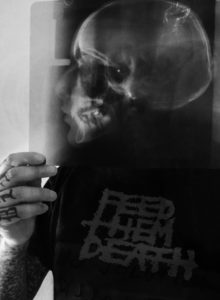
HX: I’m very excited to see what comes of that. Tell me more about the album art.
Void: The artwork is fantastic! I was looking for something with very precise characteristics to go with the music and the title: something iconic, minimalistic but powerful, austere but also weirdly sophisticated.
The photograph is an original piece by Australian artist Sophie Gabrielle. To add some context, the image was photographed a manifold of times, with its negatives sunk in polluted water and then dried allowing microbes to eat away at the negative itself.
I thought that was the perfect visual representation for the album: the process of creating that image was obscure and unconventional, and aimed at handling things in such a way as to make the invisible visible by means of manipulating the “negatives”.
We decided to keep the image simple and went with a minimalistic approach, opting to replace the traditional logo and album title with just the initials and a minus sign in the four corners of the artwork.
HX: Whoa! That’s really cool. Was the piece created specifically for the album?
Void: No, actually the photograph was part of a collection of works Sophie did called “worry about the fruit the birds won’t eat”. Although all the photos of the series are breathtakingly beautiful, I just fell in love instinctively with that one image. And then it was when I read about her approach to photography that I really felt like there was something magical about her work. She is extremely talented and I’m very grateful that she gave me the green light to use the image.
HX: That’s very cool. I’ll have to see if I can check out the rest of the series. [Editor’s note: Click here to explore the photography] So where does Feed Them Death go from here? What’s next?
Void: Hard to tell where’s next for FTD. I didn’t set myself up to release so much material in just over three years when I started. It kinda just happened. Every time I finish an album I genuinely think it could be the last one, partially because I want to maintain the intellectual freedom to call it quits if I was ever to realise that I had already said everything I wanted to say. Then an idea would spring out of nowhere, possess me entirely for a period of time and force me to find a way to give it an aural manifestation of a sort, and the process begins again. I hope to be able to cherish and protect this freedom and the acceptance that FTD, as anything else in the world, might cease to exist one day, but that until when that time comes I will keep finding ways to express myself freely.
HX: I think that’s a really great perspective to have, but I really hope (selfishly) that there will be more. Do you have anything else you think we should chat about?
Void: Lots, because I am enjoying this chat, but perhaps the last thing I would like to mention is that the new album feeds from a bitter disillusion about the music industry and especially its dynamics in what should be considered the underground. I have witnessed first hand a weird yearn for mainstream success in some bands with a rockstar attitude, complemented by a few labels mindlessly churning out bands that all sound the same. Not to mention pay per play stories everywhere, including a few dodgy labels and distributors, music venues and magazines.
The underground music is a business for many nowadays, and there is a chance that some of what reaches our ears wasn’t quite as genuinely placed out there, or with an artistic vision, as we would like to think.
But, there are still a lot of people doing it with love and passion, and that’s what counts: I thank you, MoshPitNation and all the many other reputable media partners, all the bands, labels and radio stations working hard and with integrity to create, promote and inform, and I thank all the people who are willing to proactively look for new music rather than chewing what they are being given. Maybe I am a romantic, but this is what keeps me going.
HX: I could definitely keep chatting and I’m sure we’ll talk soon, but I also need to limit it for the purposes of the interview. Lol. Thanks so much for your thoughtful and enlightening answers.
Void: Thanks man, my pleasure.
![]()
Biography: Hayduke X has been writing for MoshPitNation since June of 2016. He is also a contributor to The Metal Wanderlust. Prior to joining the MoshPitNation team, Hayduke published reviews on his own blog Rage and Frustration. In addition, he has DJ’ed an online metal radio show of the same name as his blog, written for TOmetal.com, done interviews for Metal Rules, and collaborated with The Art of B Productions to create video interviews with a wide variety of bands.
